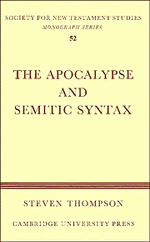
-
Select format
-
- Publisher:
- Cambridge University Press
- Publication date:
- October 2009
- January 1985
- ISBN:
- 9780511555114
- 9780521018784
- Dimensions:
- Weight & Pages:
- Dimensions:
- (216 x 138 mm)
- Weight & Pages:
- 0.23kg, 168 Pages
You may already have access via personal or institutional login
Book description
This book offers a consistent explanation of the peculiarity of the language of the Apocalypse (or Book of Revelation), namely that the rules of Greek grammar are broken because of the influence of Hebrew and Aramaic. It advances previous similar hypotheses in three ways. First, it focuses chiefly on the verbal system. Secondly, by methodically citing the ancient Greek translations of the Old Testament to demonstrate Hebrew/Aramaic influence, it serves as a limited survey of the syntax of the Septuagint. Thirdly, it argues that the Apocalypse's grammar was influenced not by later Hebrew/Aramaic dialects in use during the first century AD but by Old Testament Hebrew/Aramaic. This thesis suggests a new approach to the Apocalypse that gives greater attention to the influence of Old Testament Hebrew/Aramaic grammar and a fuller awareness of the writer's indebtedness to the Old Testament.
Contents
Metrics
Altmetric attention score
Full text views
Full text views help Loading metrics...
Loading metrics...
* Views captured on Cambridge Core between #date#. This data will be updated every 24 hours.
Usage data cannot currently be displayed.
Accessibility standard: Unknown
Why this information is here
This section outlines the accessibility features of this content - including support for screen readers, full keyboard navigation and high-contrast display options. This may not be relevant for you.
Accessibility Information
Accessibility compliance for the PDF of this book is currently unknown and may be updated in the future.


